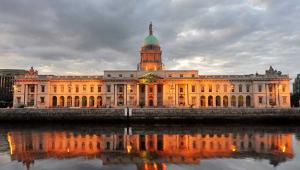However, Ireland’s finance department rejected the study’s findings, saying the researchers failed to define what a tax haven is.
The study, published earlier this month, was carried out by academics at the University California, Berkeley and the University of Copenhagen.
It said the profits hidden away in Ireland was more than those in all of the islands in the Caribbean combined (€83bn) and well ahead of Singapore (€60bn), Switzerland (€49bn) and the Netherlands (€48bn).
“By our estimates, Ireland is the number one shifting destination,” the report stated.
It suggested that €1.45trn of foreign profits were made by multinationals, mainly from the US, in 2015 and that almost 40% of this was shifted to tax havens around the world.
The US and Danish authors also suggested that the profit shifting by multinationals costs tax authorities globally about €170bn, and reduced the corporate taxes paid in the European Union by 20%.
But Ireland rejected the conclusions. The Irish Department of Finance said on Tuesday: “Ireland is not a tax haven and does not meet any of the international standards for being considered such.
“Suggesting that Ireland is a tax haven simply because of our longstanding 12.5% corporate tax rate is totally out of line with the agreed global consensus that a low corporate tax rate applied to a wide tax base is good economic policy for attracting investment and supporting growth.”
The OECD has said that Ireland does not meet the definition of a tax haven. According to the OECD, tax havens are countries with a “zero tax rate, no transparency or exchange of information” and where multinationals have no real operation “on the ground”.
A study at the end of last year suggested that European governments were leading the ‘race to the bottom’ as tax rates globally are heading towards zero.
Last month at the OECD Forum, French president Emmanuel Macron warned that the international tax system is “fundamentally flawed” and should be fixed to tackle global issues like equality and accountability.
The EU published its ‘blacklist’ of countries that can be classified as tax havens, judged against criteria such as tax transparency, fair taxation and profit shifting policies, in December.
NGOs warned that a number of EU countries – which were not included on the list – met the criteria set by the bloc, including Ireland, Luxembourg, the Netherlands and Malta.







